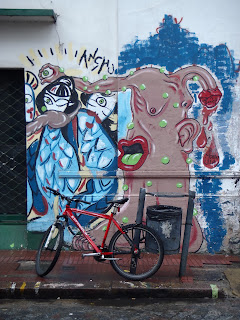I will fly back to Australia on the 27th of September.
I have been living a transitory life for a long time. I had always questioned whether I was running away from or running towards something. In my early years I was running away from something. I was running from the life of quiet desperation I knew many people lived. Running from the shackles of a 20 year mortgage. Running from jobs that I knew would have me seeing the same faces and the same spaces, a monotony that would crush the spirit. Because material possessions are hollow I gained no satisfaction from them. My ego didn’t need boosting by external goods so I avoided the debt trap that some people fall through in order to gain ’things’ they think will make them feel better about themselves. I saw all this as a weight that would drag me under.
Having gained sufficient distance from what I didn’t want the difficulty now looms of what I am running towards. I can now say that my sole ambition is to live a quiet life. I have the foundations for it and I am returning to build upon them.
As for sharing this life with someone, it seems remote. My great problem, as with all hopeless romantics, is that I am taken by beauty in isolation. I see it as if observing a painting or studying a sculpture. When the subject regains motion, unfreezing the frame, the reality check that she may not be moral, or ethical, may be superficial, may be grumpy in the morning or restless at night, may treat people badly, may be vain, may have any number of disagreeable qualities causes me to prefer the subject without the background.
Of course someone may exist for me that has both outer and inner beauty but it is a bridge too far for me to imagine that wonderful feelings could be sustained over time. It would be like seeing a gem lose its lustre once you picked it up. I am content to see it shine without possessing it.
So it seems that this South American odyssey will end in a whimper not a bang. The duration, less than anticipated. The distance, less than planned but this is looking at the glass half empty. It is half full and knowing there is many a slip betwixt the cup and the lip, half full is full enough.
I have been living a transitory life for a long time. I had always questioned whether I was running away from or running towards something. In my early years I was running away from something. I was running from the life of quiet desperation I knew many people lived. Running from the shackles of a 20 year mortgage. Running from jobs that I knew would have me seeing the same faces and the same spaces, a monotony that would crush the spirit. Because material possessions are hollow I gained no satisfaction from them. My ego didn’t need boosting by external goods so I avoided the debt trap that some people fall through in order to gain ’things’ they think will make them feel better about themselves. I saw all this as a weight that would drag me under.
Having gained sufficient distance from what I didn’t want the difficulty now looms of what I am running towards. I can now say that my sole ambition is to live a quiet life. I have the foundations for it and I am returning to build upon them.
As for sharing this life with someone, it seems remote. My great problem, as with all hopeless romantics, is that I am taken by beauty in isolation. I see it as if observing a painting or studying a sculpture. When the subject regains motion, unfreezing the frame, the reality check that she may not be moral, or ethical, may be superficial, may be grumpy in the morning or restless at night, may treat people badly, may be vain, may have any number of disagreeable qualities causes me to prefer the subject without the background.
Of course someone may exist for me that has both outer and inner beauty but it is a bridge too far for me to imagine that wonderful feelings could be sustained over time. It would be like seeing a gem lose its lustre once you picked it up. I am content to see it shine without possessing it.
So it seems that this South American odyssey will end in a whimper not a bang. The duration, less than anticipated. The distance, less than planned but this is looking at the glass half empty. It is half full and knowing there is many a slip betwixt the cup and the lip, half full is full enough.
















































